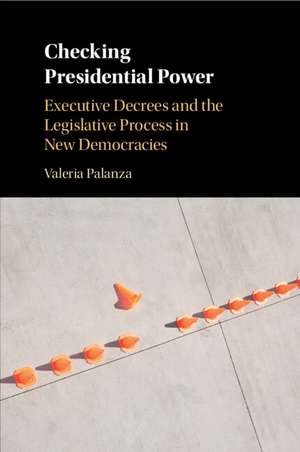Checking Presidential Power: Executive Decrees and the Legislative Process in New Democracies
Autor Valeria Palanzaen Limba Engleză Paperback – 13 apr 2022
| Toate formatele și edițiile | Preț | Express |
|---|---|---|
| Paperback (1) | 237.34 lei 3-5 săpt. | +13.77 lei 10-14 zile |
| Cambridge University Press – 13 apr 2022 | 237.34 lei 3-5 săpt. | +13.77 lei 10-14 zile |
| Hardback (1) | 693.36 lei 6-8 săpt. | |
| Cambridge University Press – 16 ian 2019 | 693.36 lei 6-8 săpt. |
Preț: 237.34 lei
Nou
Puncte Express: 356
Preț estimativ în valută:
45.42€ • 47.24$ • 37.50£
45.42€ • 47.24$ • 37.50£
Carte disponibilă
Livrare economică 22 martie-05 aprilie
Livrare express 11-15 martie pentru 23.76 lei
Preluare comenzi: 021 569.72.76
Specificații
ISBN-13: 9781108446631
ISBN-10: 1108446639
Pagini: 265
Ilustrații: 26 b/w illus. 31 tables
Dimensiuni: 152 x 229 x 14 mm
Greutate: 0.36 kg
Ediția:New ed
Editura: Cambridge University Press
Colecția Cambridge University Press
Locul publicării:New York, United States
ISBN-10: 1108446639
Pagini: 265
Ilustrații: 26 b/w illus. 31 tables
Dimensiuni: 152 x 229 x 14 mm
Greutate: 0.36 kg
Ediția:New ed
Editura: Cambridge University Press
Colecția Cambridge University Press
Locul publicării:New York, United States
Cuprins
1. Introduction: a choice of paths behind each policy; 2. Decrees versus statutes: choice of legislative paths in separation of powers systems; 3. Institutions and institutional commitment; 4. Reinstatement of congressional decision rights: Brazil; 5. A corollary of low levels of institutional commitment: Argentina; 6. The choice of legislative paths in comparative perspective; 7. Conclusions: rules, institutional commitment, and checks on presidents.
Recenzii
'Palanza brings formidable tools to bear in this book - sophisticated theory, extensive data, deep knowledge of her cases, and clear writing. She tests her ideas with extensive studies of policy making in Brazil and Argentina, as well as with rigorous analysis drawing data from across Latin America. She shows us what factors push presidents toward unilateral policymaking and what institutional conditions foster legislative influence. This book is a real achievement.' John M. Carey, John Wentworth Professor in the Social Sciences, Dartmouth College
'Palanza's Checking Presidential Power is a long overdue corrective to the often uncritical assumption that presidents are all-powerful and that legislatures (and courts) are mere bystanders in Latin America's separation-of-powers systems. By refusing to consider presidents and their decrees in isolation, Palanza's book gives us a much more holistic account, both theoretically and empirically, of how policy gets made in separation-of-powers systems.' Brian F. Crisp, Washington University, St Louis
'This is a great book. It is the first to provide a comprehensive and positive theory of the choice between policy-making by decree versus statute. Unlike previous work, it places the decision about the relative incidence of executive decrees in a broad strategic context, which includes not only the president but also legislators, the courts and interest groups. Palanza offers detailed empirical analysis of decree usage in several countries, as well as, to my knowledge, the first cross-national analysis of law-making by decree in presidential systems. This book will be required for anyone interested in executive politics, institutional analysis, presidentialism, democratization, Latin American and many other areas.' José Antonio Cheibub, Mary Thomas Marshall Professor in Liberal Arts, Texas A & M University
'In her groundbreaking book, Palanza (Pontificia Universidad de Chile) examines policy making in separation of powers systems by explaining the levels of reliance on executive decrees that may lead to unbalanced presidential systems and ultimately low democratic quality. The author accurately defends the long-held belief that policy enacted by decree is less stable than policy enacted by the widely supported congressional statutes.' K. M. Zaarour, Choice
'Palanza's Checking Presidential Power is a long overdue corrective to the often uncritical assumption that presidents are all-powerful and that legislatures (and courts) are mere bystanders in Latin America's separation-of-powers systems. By refusing to consider presidents and their decrees in isolation, Palanza's book gives us a much more holistic account, both theoretically and empirically, of how policy gets made in separation-of-powers systems.' Brian F. Crisp, Washington University, St Louis
'This is a great book. It is the first to provide a comprehensive and positive theory of the choice between policy-making by decree versus statute. Unlike previous work, it places the decision about the relative incidence of executive decrees in a broad strategic context, which includes not only the president but also legislators, the courts and interest groups. Palanza offers detailed empirical analysis of decree usage in several countries, as well as, to my knowledge, the first cross-national analysis of law-making by decree in presidential systems. This book will be required for anyone interested in executive politics, institutional analysis, presidentialism, democratization, Latin American and many other areas.' José Antonio Cheibub, Mary Thomas Marshall Professor in Liberal Arts, Texas A & M University
'In her groundbreaking book, Palanza (Pontificia Universidad de Chile) examines policy making in separation of powers systems by explaining the levels of reliance on executive decrees that may lead to unbalanced presidential systems and ultimately low democratic quality. The author accurately defends the long-held belief that policy enacted by decree is less stable than policy enacted by the widely supported congressional statutes.' K. M. Zaarour, Choice
Notă biografică
Descriere
Provides the first comparative look into executive decree authority. It explains why presidents issue decrees and why checks and balances sometimes fail.
